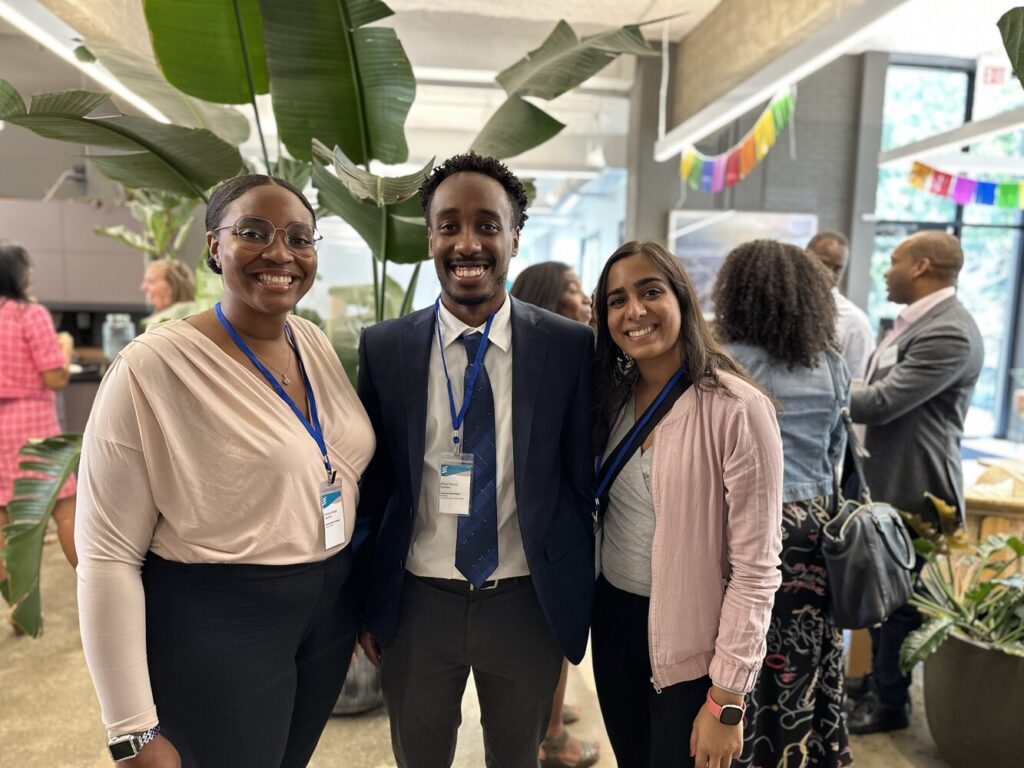By Dr. Sriram Shamasunder, Director & Co-Founder UCSF HEAL Initiative and Heather Anderson, CEO of Global Health Corps
America’s health workforce is in crisis—again. COVID-19 exposed deep fractures in our healthcare system and five years later instead of strengthening the foundation, the Trump Administration is taking a sledgehammer to it. Through executive orders slashing health funding, halting USAID’s critical global health work, and attacking diversity, equity, and inclusion (DEI) initiatives, this administration wasted no time dismantling the systems keeping our public health infrastructure from collapsing. The public health and medical professionals still standing will need serious support to advance their life-saving work in the face of these headwinds.
The administration’s attacks don’t just threaten healthcare workers—they endanger the communities they serve, particularly in resource-denied areas where burnout, vacancies, and turnover rates are already at catastrophic levels. Nearly half of U.S. public health workers are considering leaving their jobs. Hospitals are facing a staggering 22.7% turnover rate. Without strong investments in training, mentorship, and support, the pipeline of public health and healthcare professionals will continue to shrink, leaving patients without adequate care and health systems on the verge of collapse.
In an ever-connected world, the administration’s stop-work order on USAID and cuts to international health funding also heighten demands on the U.S. public health workforce. As we’ve learned the hard way with COVID and Ebola, diseases don’t respect national borders. Public health leaders in the U.S. must be equipped to think globally and act locally. We desperately need to cultivate this lens in emerging leaders and embed them in tight-knit global networks that facilitate learning, resource sharing, and collaboration for better health for all.
Meanwhile, the attack on DEI initiatives pose another threat to the U.S. health workforce. The sector is already struggling to retain BIPOC professionals who reflect our diverse communities because of a lack of mentorship, training, and financial support. Slashing DEI efforts only accelerates that exodus, widening health disparities and eroding trust. Instead of weakening these initiatives, we must double down on efforts to ensure health workers from all backgrounds have the opportunities and support they need to lead and innovate.
As the Executive Director & Co-Founder of UCSF’s HEAL Initiative and the CEO of Global Health Corps (GHC), we’ve made it our mission to tackle these issues head-on. We focus on equipping health professionals serving underserved communities who are ready to lead the charge. HEAL trains and mentors healthcare professionals like doctors and midwives, while GHC empowers public health program managers, data analysts, and communicators. Together, we’re proving that investing in people works. It needs to be prioritized as both a life-saving response to the current crises and a long-term strategy for sustainable progress towards equity.
The desire to serve is there. Health professionals want to make a difference in resource-denied communities, but many are burnt out and under-supported. The result? A vicious cycle where the communities that need care the most are left without enough caregivers.
Julia Pettengill, Executive Director of The Schooner Foundation, which funds both GHC and HEAL, puts it best: “Health equity philanthropy often focuses on numbers—how many illnesses are treated or interventions distributed. But we can’t hit those targets without investing in the people who deliver the care.”

Take Simone Snead, MPH, CLC, a GHC alumna and maternal health program manager. Before GHC, she felt stuck in silos. But with mentorship and professional development, she learned to connect the dots across issue areas and communities, driving better outcomes for families in her work with the March of Dimes. Then there’s Juana Veronica Aragon, a nurse and HEAL alumna serving Monterey County, California. The pandemic nearly overwhelmed her, but the network she built through HEAL kept her going. “That sense of unity and purpose helped feed my soul,” she says. Today, she’s leveraging global insights to tackle local challenges, proving that investments in local leadership can drive big change.
Belonging, mentorship and upskilling were all highlighted in a recent study to improve the retention impact of National Health Service Corps, a federal program focused on improving the number of providers in underserved parts of the United States. GHC and HEAL’s programs provide these supports, and both our programs see consistently more demand than we can meet with current resources.
The next public health crisis isn’t a question of “if” but “when.” And thanks to these reckless policies, we’re sprinting toward the edge of a cliff. This moment demands action—not just to repair what’s been broken, but to build something stronger, fairer, and more sustainable. With a workforce that is supported, connected, and equipped to innovate, America’s health system can stand up to the weight of future crises.
We must heal the healers. They’ve carried America’s health on their backs for too long. It’s time to give them the resources, respect, and support they need. The alternative? A fractured system that will fail us all.
